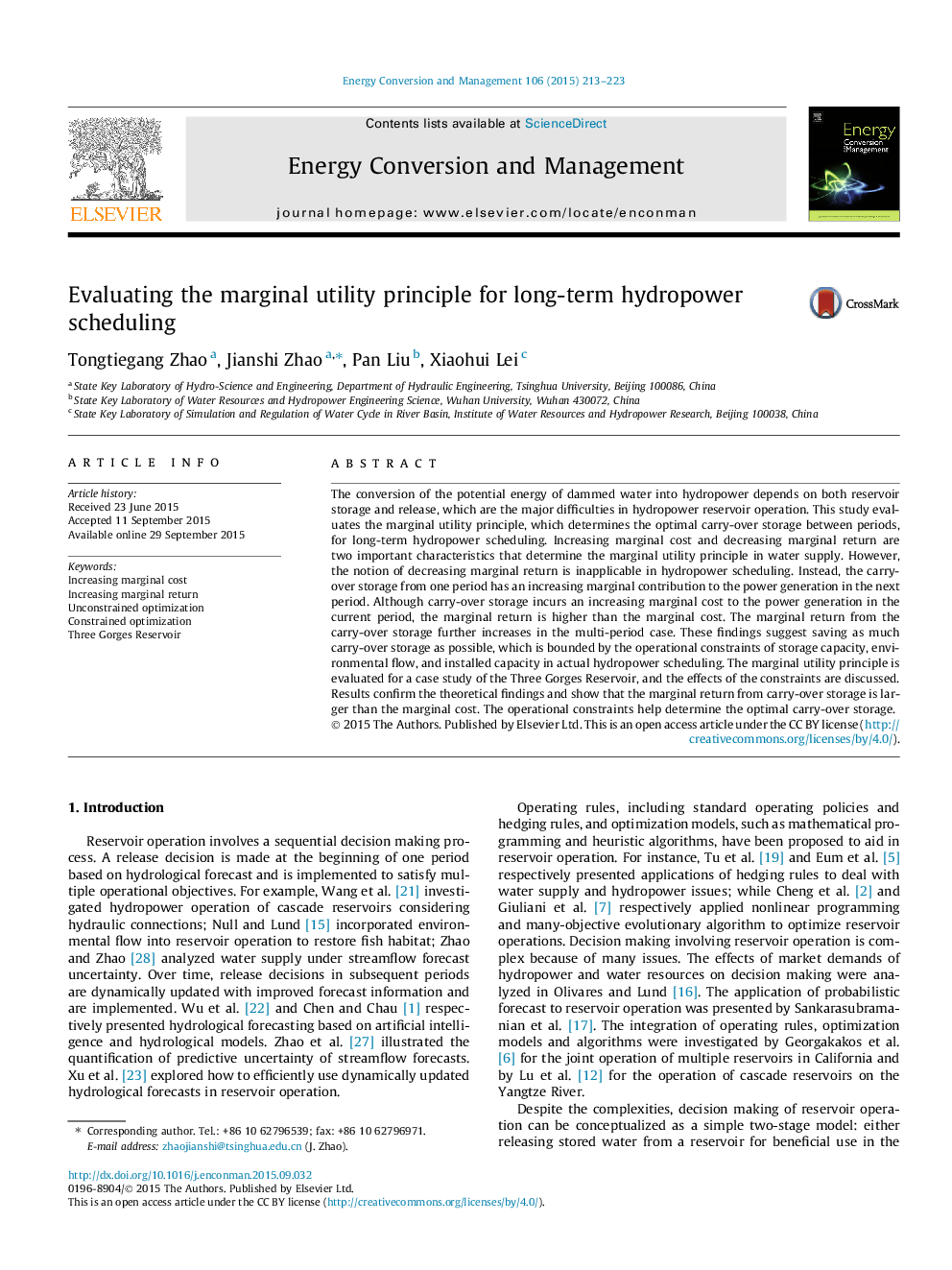| کد مقاله | کد نشریه | سال انتشار | مقاله انگلیسی | نسخه تمام متن |
|---|---|---|---|---|
| 7161783 | 1462856 | 2015 | 11 صفحه PDF | دانلود رایگان |
عنوان انگلیسی مقاله ISI
Evaluating the marginal utility principle for long-term hydropower scheduling
ترجمه فارسی عنوان
ارزیابی اصل ابزار حاشیه ای برای برنامه ریزی طولانی مدت نیروگاه های آبی
دانلود مقاله + سفارش ترجمه
دانلود مقاله ISI انگلیسی
رایگان برای ایرانیان
کلمات کلیدی
افزایش هزینه های حاشیه ای، افزایش بازدهی حاشیه ای، بهینه سازی بدون محدودیت، بهینه سازی محدود، سه غبار مخزن،
ترجمه چکیده
تبدیل انرژی بالقوه آب سد به هیدرولیکی بستگی به ذخیره و ذخیره مخزن دارد، که مهمترین آنها در کار مخزن آبی است. این مطالعه ارزیابی عملکرد حاشیه ای است که میزان ذخیره سازی مطلوب بین دوره ها را برای برنامه ریزی طولانی مدت آب آبی تعیین می کند. افزایش هزینه های حاشیه ای و کاهش بازده حاشیه ای، دو ویژگی مهم هستند که تعیین کننده اصل حاشیه در تامین آب می شود. با این حال، مفهوم کاهش بازده حاشیه ای در برنامه ریزی آب آبی قابل اجرا نیست. در عوض، ذخیره سازی انتقال از یک دوره، سهم نهایی افزایش تولید برق در دوره بعدی را افزایش می دهد. اگر چه ذخایر حمل و نقل هزینه گرانی ناشی از تولید برق را در دوره فعلی افزایش می دهد، بازدهی حاشیه بالاتر از هزینه حاشیه ای است. بازده حاشیه ای از ذخیره سازی حمل و نقل بیشتر در پرونده چند دوره افزایش می یابد. این یافته ها نشان می دهد که صرفه جویی در زمان ذخیره سازی به همان اندازه که ممکن است ذخیره سازی، که محدودیت های عملیاتی ظرفیت ذخیره سازی، جریان محیطی و ظرفیت نصب شده در برنامه زمانبندی آب و برق واقعی را محدود می کند. اصل کارآیی حاشیه ای برای مطالعه موردی سه مخزن گرجستان مورد بررسی قرار گرفته است و اثرات محدودیت ها مورد بحث قرار گرفته است. نتایج یافته های نظری را تایید می کنند و نشان می دهد که بازده حاشیه ای از ذخیره بیش از هزینه های حاشیه ای است. محدودیت های عملیاتی به تعیین ذخیره سازی انتقال بهینه کمک می کند.
موضوعات مرتبط
مهندسی و علوم پایه
مهندسی انرژی
انرژی (عمومی)
چکیده انگلیسی
The conversion of the potential energy of dammed water into hydropower depends on both reservoir storage and release, which are the major difficulties in hydropower reservoir operation. This study evaluates the marginal utility principle, which determines the optimal carry-over storage between periods, for long-term hydropower scheduling. Increasing marginal cost and decreasing marginal return are two important characteristics that determine the marginal utility principle in water supply. However, the notion of decreasing marginal return is inapplicable in hydropower scheduling. Instead, the carry-over storage from one period has an increasing marginal contribution to the power generation in the next period. Although carry-over storage incurs an increasing marginal cost to the power generation in the current period, the marginal return is higher than the marginal cost. The marginal return from the carry-over storage further increases in the multi-period case. These findings suggest saving as much carry-over storage as possible, which is bounded by the operational constraints of storage capacity, environmental flow, and installed capacity in actual hydropower scheduling. The marginal utility principle is evaluated for a case study of the Three Gorges Reservoir, and the effects of the constraints are discussed. Results confirm the theoretical findings and show that the marginal return from carry-over storage is larger than the marginal cost. The operational constraints help determine the optimal carry-over storage.
ناشر
Database: Elsevier - ScienceDirect (ساینس دایرکت)
Journal: Energy Conversion and Management - Volume 106, December 2015, Pages 213-223
Journal: Energy Conversion and Management - Volume 106, December 2015, Pages 213-223
نویسندگان
Tongtiegang Zhao, Jianshi Zhao, Pan Liu, Xiaohui Lei,
